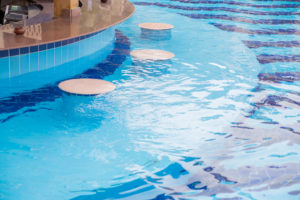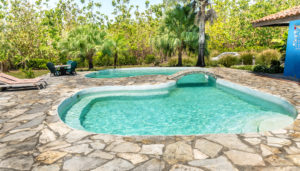Residential License # 890459
Commercial License # 3667

Talk to an Expert
Residential License # 890459
Commercial License # 3667

Talk to an Expert
Choosing salt or chlorine pools is a reason for concern for most, concerning maintenance, ease on the skin, and long-term value. Saltwater pools use a generator to transform salt into chlorine, which tends to result in softer, less irritating water and less maintenance to apply chemicals to the water. Chlorine pools are generally fed chlorine that has been acquired, and maintenance is relatively straightforward, with established methods requiring little work. Each option has unique perks to be considered depending on your lifestyle, requirements, and resources. At TurnKey Pool Designers, we can assist you in choosing the right pool for you.

The salt chlorine pool uses salt, where a chlorine-free swimming experience is guaranteed in comparison to regular chlorine pools; a method that eliminates the fuss of putting chlorine into the pool is electrolysis of the added salt into hypochlorous acid or HOCl. Softer feelings and less odor of chemicals are important pros for relaxing swims.
The way saltwater pools work: A saltwater chlorine generator constantly converts dissolved salt to chlorine and keeps sanitation independent of chlorine addition regularly, although salt levels are relatively low, between 3000 and 4000 ppm, which is a little bit less salty than our tears! This even makes the chemical balance stable, allowing for less constant adjustment.
To run up to optimal performance, one should ensure using a high-purity pool-grade salt, like that which has been manufactured by solar or mechanically evaporated methods, and make do with table or rock salt, as they might contain unwanted minerals. An important part of this whole setup is the salt chlorine generator, control panel, and salt cells, which usually last around 5 to 7 years, with their replacement costs ranging from $160 to $550. Cleaning cells regularly is essential during maintenance and will maintain monthly chemical costs at around $30.
Important components of the system include the salt chlorine generator, a control panel, and salt cells. Salt cells generally last anywhere from five to seven years. Replacement costs can range from $160 to $550, depending on the model. You can keep salt cells clean.

Chlorine pools are the bread and butter of pool sanitation. For more than half a century, their reliability has made them legendary. These pools rely on chlorine-based chemicals as a primary means to disinfect the water. This helps keep your pool safe, clean, and free from nasty bacteria and algae.
This method, which sanitizes water with chlorine in liquid, powder, or tablet form, will keep the water clean, clear, and safe, but will require weekly maintenance of over an hour a week for pH and chlorine testing. Chlorine is a competent sanitizer that kills most germs. Still, because chlorine is broken down quickly in the sun, the chlorinator has to run continuously or be replaced every couple of days. Therefore, good sanitation also requires skimming debris during the week and regular cleanings. Chlorine pools are also generally less expensive for the initial installation than saltwater systems, making them more appealing to budget-conscious homeowners.
Chlorine is vital in pool water chemistry, disinfection, and the control of algae growth. Of further importance is the interconnectedness of chlorine effectiveness with balanced pH levels; if the pH is not standard, chlorine may lose lung effectiveness, resulting in cloudy water or irritation to the swimmers. Regular weekly testing and adjustments make it easy to avoid these issues and provide optimum swimming conditions.
Different types of chlorine can be used, including liquid bleach, granules, and tablets. Tablets are generally the most convenient way to chlorinate since they are often used in floating dispensers or automatic feeders. Liquid chlorine dissolves very rapidly but has to be handled with caution; granules have the versatility to spot-treat. Each type has its pros and cons, depending on the maintenance preference of the owner.
The salt chlorine swimming pool is a more pleasant swimming pool experience, with softer water that is gentler on the skin and eyes. These pools are good for families with sensitive skin since the automatic salt chlorine generator gives stable chlorine levels without the inconvenience of doing it manually. This system cuts down on the very need for chemical adjustments and the old smell of chlorine that resembles fresh air more than a muggy interior.
However, the saltwater pool can cost between $2000 and $3000, installation included, and may also incur 50% more annual maintenance costs than traditional swimming pools. You will have to test pH and chlorine levels regularly and modify the salt as needed, usually monthly. Salt can corrode metallic components, with the replacement of salt cells necessary every five to seven years, lending additional expense. The saltwater pool, with routine cleaning and system monitoring, can last a very long time.
The rationale, of course, is that chlorine pools remain inexpensive options preferred by most homeowners. The chlorine pool effectively kills bacteria and keeps the water clean and bright. Nonetheless, the unique charm of these pools is matched by their maintenance demand and attendant safety issues that prospective owners must carefully consider.
Initially cheaper because they use simpler installation materials than saltwater systems. Chlorine is great at killing germs and preventing algae buildup as long as it is regularly maintained. Users can balance water using chlorine quite easily, especially after heavy bather loads or storms, and it is compatible with a variety of finishes, including vinyl liners.
Cheaper but expensive over time due to pool chlorination, costing an average of $20,000 per year. Routine maintenance is required, including skimming or vacuuming grime, checking pH and chlorine levels, and using algaecide on the pool. Water conditions are such that coagulation and the removal of biological impurities in the water require constant attention. A higher percentage of owners find chlorine pools more onerous in terms of maintenance than saltwater systems.
Safe storage, use, handling, and disposal of chlorine are essential, as skin, eyes, and/or the respiratory system are known to be affected by it. For the sake of the swimmer’s safety, regular testing of chlorinated levels is required to ensure the experience is a pleasurable one.
Chlorine pools remain a viable option due to modern dosing systems and chemical monitors that make maintenance simple, even in the harsh conditions of the desert. They are more affordable and require regular maintenance, but they are adept at keeping the water sanitized.
The choice between saltwater and chlorine pools depends on one’s lifestyle, budget, and maintenance inclination. Saltwater systems may seem like an easier pool experience since they also offer low costs for chemicals over the long run, while chlorine pools are an excellent form of water treatment. Hybrid systems equally balance both systems, offering convenience and overall control. Knowing what you need, this knowledge will go a long way in helping you make the choice when it comes to fun swimming. Get in touch with us today at TurnKey Pool Designers to see how we can help you and start planning the pool of your dreams.